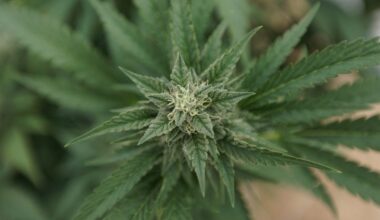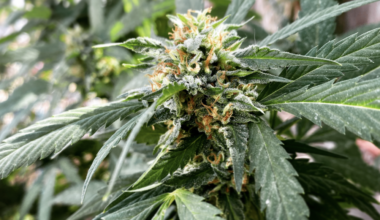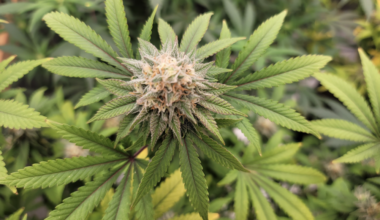California marijuana regulators are seeking input on proposed rules to standardize cannabis testing methods in the state—an effort that officials hope will stop marijuana businesses from “laboratory shopping” to find facilities that are more likely to show higher THC concentrations that they can then boast for their products.
While there are already statewide rules in place that require cannabis products to be tested for cannabinoid content and possible contaminants, licensed testing laboratories don’t currently share a uniform methodology, meaning the results of marijuana analyses might differ from facility to facility.
Because of consumer demand for high-THC products, the state says its aware of instances where cannabis businesses shop around for laboratories to find ones where the testing methodology tends to produce results showing more of the intoxicating cannabinoid.
To help address the issue, the California Department of Cannabis Control (DCC) announced on Friday that it is initiating a rulemaking process to develop standardized testing methods that every licensed laboratory would need to adopt.
“One of the challenges we face in regulating an industry that is not federally recognized, is the lack of standardized, and validated methods for testing,” DCC Director Nicole Elliott said in a press release. “Individual, licensed laboratories use different methods which may produce inconsistent results and inaccurate data on cannabis cannabinoid content. DCC is working to change that so there is greater integrity in the market, accurate information for consumers, and confidence among stakeholders.”
DCC is accepting public comment on proposed cannabis testing methodology regulations until August 2. For those who want to testify in person, a public hearing is scheduled for August 1.
“These standards build upon existing standards for testing laboratories by requiring them to utilize only cannabinoid testing methods designated by DCC,” Elliott said. “The ultimate goal is protecting public health and safety by providing consumers accurate and consistent information on the cannabis they purchase.”
The announcement from regulators comes a week after Gov. Gavin Newsom (D) signed a wide-ranging bill to restructure the state’s adult-use marijuana program, including by eliminating a cannabis cultivation tax, in an effort to provide industry relief and further curtail the illicit market.
AB 195, which builds upon an amended budget proposal that the governor unveiled in May, passed both chambers with nearly unanimous support last week.
—
Marijuana Moment is tracking more than 1,500 cannabis, psychedelics and drug policy bills in state legislatures and Congress this year. Patreon supporters pledging at least $25/month get access to our interactive maps, charts and hearing calendar so they don’t miss any developments.![]()
Learn more about our marijuana bill tracker and become a supporter on Patreon to get access.
—
The key provisions going into effect eliminate the marijuana cultivation tax and shift the point of collection and remittance for the separate 15 percent excise tax on cannabis sales from the distribution to retail level. Additionally, there will be no increase in the excise tax for at least three years under the proposal, which is expected to be signed by the governor and then take effect immediately.
Also, the new law includes a $20 million one-time grant program to support the development and implementation of local retail licensing efforts. That’s an important component that’s meant to help reduce the cannabis policy gap throughout California, where more than half of the state’s cities and counties do not allow any type of cannabis licensees to operate in their area.
Relatedly, state officials launched a new resource in May, providing people with an interactive map showing where marijuana businesses are permitted—and where they are blocked from opening—throughout the state.
Meanwhile, California officials are distributing another round of community reinvestment grants totaling $35.5 million with tax revenue generated from recreational marijuana sales.
The Governor’s Office of Business and Economic Development (GO-Biz) announced last month that they’ve awarded 78 grants to organizations throughout the state that will support economic and social development in communities disproportionately impacted by the war on drugs.
The amount of funding and number of recipients increased from last year’s levels, when the state awarded about $29 million in grants to 58 nonprofit organizations through the CalCRG program.
California has taken in nearly $4 billion in marijuana tax revenue since the state’s adult-use market launched in 2018, the Department of Tax and Fee Administration (CDTFA) reported late last month. And for the first quarter of 2022, the state saw about $294 million in cannabis revenue generated from the excise, cultivation and sales tax on marijuana.
The state collected about $817 million in adult-use marijuana tax revenue during the last fiscal year. That represented 55 percent more cannabis earnings for state coffers than was generated in the 2020-2021 period.
California officials also announced in January that the state had awarded $100 million in funding to help develop local marijuana markets, in part by getting cannabis businesses fully licensed.
DCC distributed the funds to 17 cities and counties where there are a disproportionate number of provisional marijuana licenses, rather than full-year licenses. The department first announced that applications for the Local Jurisdiction Assistance Grant Program had opened in October.
Meanwhile, the California Assembly approved a Senate-passed bill last week that would establish a pilot program to allow certain jurisdictions throughout the state to authorize safe consumption sites where people could use currently illicit drugs in a medically supervised environment.
Medical Disclaimer:
The information provided in these blog posts is intended for general informational and educational purposes only. It is not a substitute for professional medical advice, diagnosis, or treatment. Always seek the advice of your physician or other qualified healthcare provider with any questions you may have regarding a medical condition. The use of any information provided in these blog posts is solely at your own risk. The authors and the website do not recommend or endorse any specific products, treatments, or procedures mentioned. Reliance on any information in these blog posts is solely at your own discretion.







